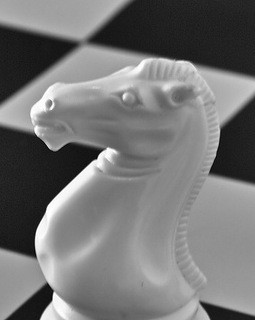Toward a Clarification of the Word “Chivalry”
by Jake Flanagin

I am of the opinion that a major front of “the gender wars” could be won with a simple lesson in etymology. If we merely understood the actual meanings and histories that certain loaded words contain, we could be living in a post-gender society. Maybe.
“Chivalry” is one of those words. And it seems to be getting a lot of attention lately. Specifically (from a so-called website), regarding its so-called death. Some say men are to blame — men who no longer feel obligated to hold open doors, pull out chairs, or cover the cost of dinner for their female companions. Some say it’s women who are at fault — women who are too independent, too self-sufficient; women who don’t give men a reason to be chivalrous. Purportedly, these are all symptoms of our society’s descent into moral degeneracy. Purportedly.
Of course, those who most loudly decry its decline tend to have the narrowest, most distorted notion of what “chivalry” actually is. It comes from the Anglo-French chevalerie, which is derived from chevaler, the Old French word for a knight on horseback. I assure you, the medieval Normans had little time to deliberate such frilly conundrums as the etiquette of going Dutch on a bill. Things like not dying of plague tended to take precedence. In any case, if we’re to abide by the origins of the word, being chivalrous entails little more than owning a horse.
No, the historical qualifications for chevalerie had very little to do with horses, women, or the treatment thereof. The British monarchy, for instance, traditionally bestowed knighthood in return for superior military service — a field generally dominated by men; some good, some bad. True, chivalric code dictated that knights use their weapons chiefly for the protection of the weak (read: women and children), but the idea of a knight-errant — roving the countryside, performing random acts of valor — is a fairytale. A knight’s gotta eat. In order to survive, he would fight in the employ a liege lord, a nobleman who swore no such oath of chivalry to gain his title, land, and (most important) coinage.
In 1917, the British Crown began knighting men and women, recipients ranging from industrialists and scientists, to actors and schoolteachers. Helen Mirren, Jane Goodall, and Miriam Rothschild have all been knighted. It’s an accolade they all deserve. All three are definitively chivalrous.
Why? Because, ironically, the antiquated institution that is the British monarchy takes a fairly modern and meritocratic approach to knighthood: those individuals who have made “significant contributions to [British] life.” That is, to say, those who have performed a service of genuine societal value. Those who have made great films, developed cures for deadly diseases, and yes, even fought in the occasional war.
Holding the door open for a lady does not make a man “chivalrous.” Equating the two suggests that men, by carrying out simple, quotidian niceties — actions whose good intentions sometimes obscure their roots in the patriarchal conception of women as fragile — have achieved an award-winning distinction. Paying for dinner does not a white knight make. So do the world a favor: get off your high horse.
Photo via pianowow/flickr.
Jake Flanagin is a researcher at The Atlantic. You can follow him on Twitter @jakeflanagin.